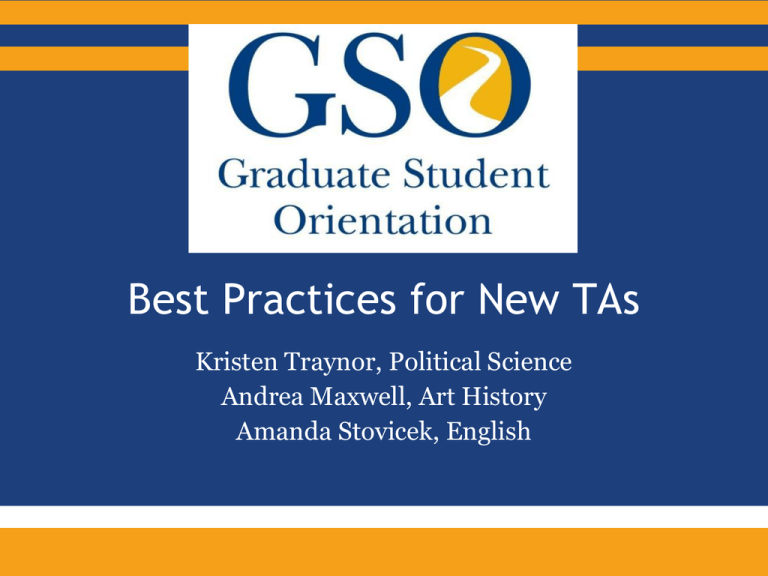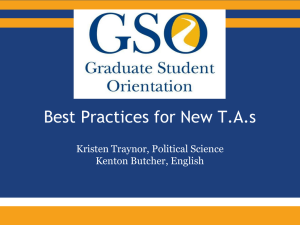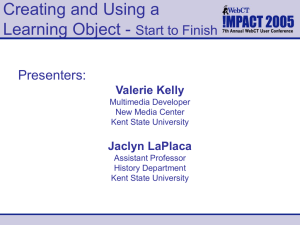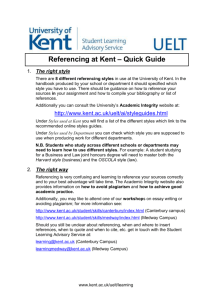Best Practices for New TAs Kristen Traynor, Political Science Amanda Stovicek, English
advertisement

Best Practices for New TAs Kristen Traynor, Political Science Andrea Maxwell, Art History Amanda Stovicek, English General Advice • Treat syllabus as a contract • Remember level of course • Know requirements course fulfills • Keep diversity and cultural backgrounds in mind • Proofread before you print or send it Basic Syllabus Information • What information should you include on your syllabus? • Course name • Course ID number • Course registration number (CRN) • Days, time, and room number • Your name and email address • Office location and phone number • Office hours • Course Description University Policies and Requirements • Last day to add/withdraw from course – Spring: January 25 March 22 • Final exam schedule (kent.edu/registrar) • Grading Scale: 93-100 – A 83-86 – B 73-76 – C 60-66 – D 90-92 – A80-82 – B70-72 – C59 or below – F 87-89 – B+ 77-79 – C+ 67-69 – D+ • Policies to copy and paste – Student Accessibility Services (kent.edu/sas) – Academic Honesty (kent.edu/policyreg) Course Policies • What types of policies do you think are important to include? • Attendance and tardiness – Absences and tardiness – Participation points • Grading policy – Late work, make-up assignments, extra credit, rewrites • Technology – Laptops, tablets, mobile phones • Classroom etiquette – Behavior, disruptions, eating, drinking Course Objectives • What do you want students to learn by the end of the course? • Specific to the course • Objective, measurable, and attainable • Where might you find possible objectives? •“Reverse” or “backwards” design – Objectives for end of course – Themes and concepts to cover – Textbook/reading materials – Assessment tools Creating Learning Assessments • Goal: Measure Course Objectives • Refer to your department • Multiple opportunities to demonstrate learning • Consider size of class & discipline • Clearly state what assessments you will use Responding to Student Writing • Make it easy on yourself. • Consider higher- & lower-order concerns. • Revision is a win-win. • Dealing with plagiarism – Plagiarism School Grading Disputes • Use grading rubrics and samples • Update students’ grades on Blackboard • Keep records of all grading conversations • Fairness in alternative assignments • Assigning W, NF, SF, IF/ID, IP Scheduling • Create a timeline for the semester • Check your own schedule first! • Consider grading time • Reasonably space items out • Match reading assignments with lecture Scheduling • Avoid religious holidays, if possible • Make due dates STAND OUT • Build in flexibility! – – – – “Subject to change” disclaimer Plan extra material Promise to announce changes early Avoid changing due dates/exams Strategies for Teaching • Evaluate your class and your material –how to approach? • Be aware of presentation • Begin with summary, critical thinking question, survey – reinforces learning/recall • Be flexible –allow time for questions, tangents How do you learn? Styles • Visual: 65% • Auditory: 30% • Kinesthetic: 5% Strategies for Instructors • Visual: – Charts, colors, graphics, concept maps • Auditory: – Key ideas through voice inflections, speaking aloud • Kinesthetic: – Analogies, anecdotes, writing on flip charts, “active” activities Get your phones out… Respond to the following poll about your learning style. Visual, Auditory, Kinesthetic How could we approach World War II for each of these learning styles? Principals of Engaged Teaching • Come prepared • Think about 3 learning styles in your presentation material • Use emotions to help information stick (e.g., humor, sadness) • Incorporate breaks/physical movement • Reinforce ALL responses in discussion • Guide the group in discussion Self-Evaluation Yourself • Journaling after each class – What could you improve on? • Awareness of student engagement – Do they look bored? Interested? • University evaluations – End of semester evaluations (mandatory) Your Students • Weekly response questions: – What did you learn? – What are you still unsure of/confused about? • Mid-semester evaluation for course content Questions? Questions? Kristen Traynor ktraynor@kent.edu Andrea Maxwell amaxwe10@kent.edu Amanda Stovicek astovice@kent.edu Source List ADPRIMA Center for Innovation in Teaching & Learning Eberly Center Falk 2012 Huston 2009 Kent State University Cheating and Plagiarism Policy Kent State University Registrar Kent State University Student Accessibility Services Lang 2008 ProfHacker VCU Center for Teaching Excellence Source List Learning styles: Overview of learning styles @ ldpride , MSU designs for adult learning, Visual learning style, Auditory learning style, Verbal learning style, Kinesthetic learning style Lecture: Tools for Teaching by Barbara Gross Davis, University of CA, Berkeley Brown and Atkins, 1988; Frederick, 1986; Lowman, 1984; Penner, 1984 Discussion: Derek Bok Center for Teaching and Learning and discussions, The Teaching Center @ WSUSL on discussions



